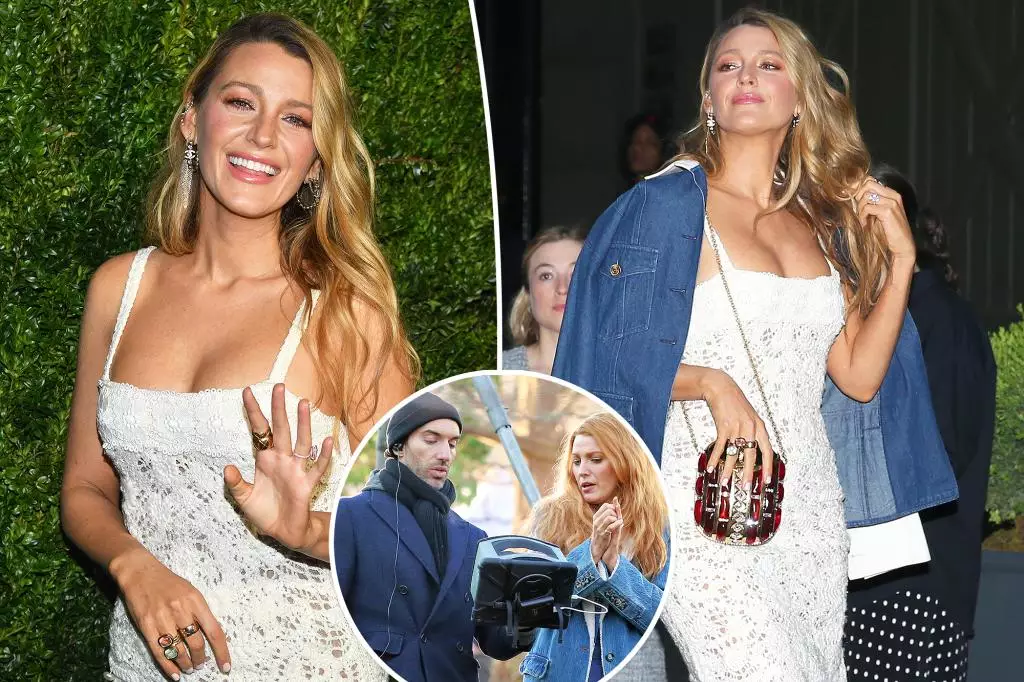Blake Lively, an emblem of strength and resilience, dazzled onlookers with her radiant presence at the recent Chanel Tribeca Festival Artists Dinner in New York City. The actress, widely recognized for her role in “Gossip Girl,” illuminated the red carpet not only by her fashion choices but also by the significant legal victory she celebrated that very day. Clad in a chic white crochet dress and a vintage denim jacket—an assertive nod to her versatile style—Lively turned heads and captured hearts. Her ensemble, complemented by elegant Christian Louboutin heels and a striking Chanel scarab purse, exemplified her ability to blend sophistication with a touch of casual flair.
Unfortunately, the night was not solely about fashion. Lively had just triumphed in a remarkable legal battle against Justin Baldoni, a development that holds profound implications for her and many individuals grappling with similar issues. This juxtaposition of glamor and turmoil reflects a recurring theme in celebrity culture: public personas often masked in personal hardship.
Legal Drama Unfolding
The courtroom drama unfolded under the scrutiny of Judge Lewis J. Liman, who dismissed Baldoni’s staggering $400 million lawsuit against both Lively and her husband, Ryan Reynolds. This dismissal was not merely procedural; it was a pivotal moment underscoring the legal system’s complexities and the often harsh realities of celebrity life. Notably, the judge refuted Baldoni’s claims, outlining that neither Lively nor Reynolds could be held liable for any defamation stemming from the statements made as part of her legal complaint against him. This ruling sends a vital message about the boundaries of legal responsibility and accountability in high-stakes litigation.
During this turbulent period, Lively’s dignified resolve was evident. In her Instagram Story, she conveyed her commitment to advocating for women’s rights to voice their experiences with harassment, a stance crucial in a climate where many individuals feel silenced. Her words resonated deeply, reflecting the ongoing struggle of countless individuals who battle both systemic injustices and personal repercussions for standing up against their abusers.
The Weight of Retaliation
Lively’s heartfelt comments about the psychological toll of retaliatory lawsuits highlight an often-ignored angle in high-profile legal disputes. Her experience with manufactured shame—a tactic frequently employed by those with more resources—serves as a stark reminder of the power dynamics in play. While Lively emerged relatively unscathed, many individuals lack the financial and emotional support to wage similar battles. Her acknowledgment of this disparity amplifies a crucial conversation about fairness and accessibility in legal recourse.
On the flip side, Baldoni’s countersuit adds intrigue to the legal saga. By rejecting the allegations of misconduct and claiming defamation against both Lively and her publicist, he has positioned himself in yet another vortex of public scrutiny. The delicate balance between defending one’s reputation and protecting oneself from genuine accusations creates an unsettling courtroom atmosphere that often extends beyond legal merit into the realm of public perception.
A Broader Commentary on Cultural Shifts
Lively’s recent experience transcends the personal, resonating with broader societal movements that challenge the status quo against sexual harassment and systemic inequity. This case stands as a microcosm of a larger cultural shift where victims are increasingly vocal, fortifying their narratives against rich and powerful adversaries. It embodies the fight for dignity, safety, and respect, core tenets that underlie contemporary discussions on gender equity.
As spectators, we should be inspired not merely by Lively’s legal victory but also by her unwavering commitment to harnessing her platform for advocacy. Her journey illustrates that even in the glitzy world of Hollywood, deep personal battles unfold behind the scenes. Through her continued activism and resilience, she not only redefines her narrative but also uplifts countless others navigating similar paths of dispossession and injustice.
In sum, Lively’s triumph represents much more than just a courtroom victory; it is a celebration of courage, a rallying cry for those with less power, and an insistence on the vital importance of every woman’s voice in the fight against injustice.

